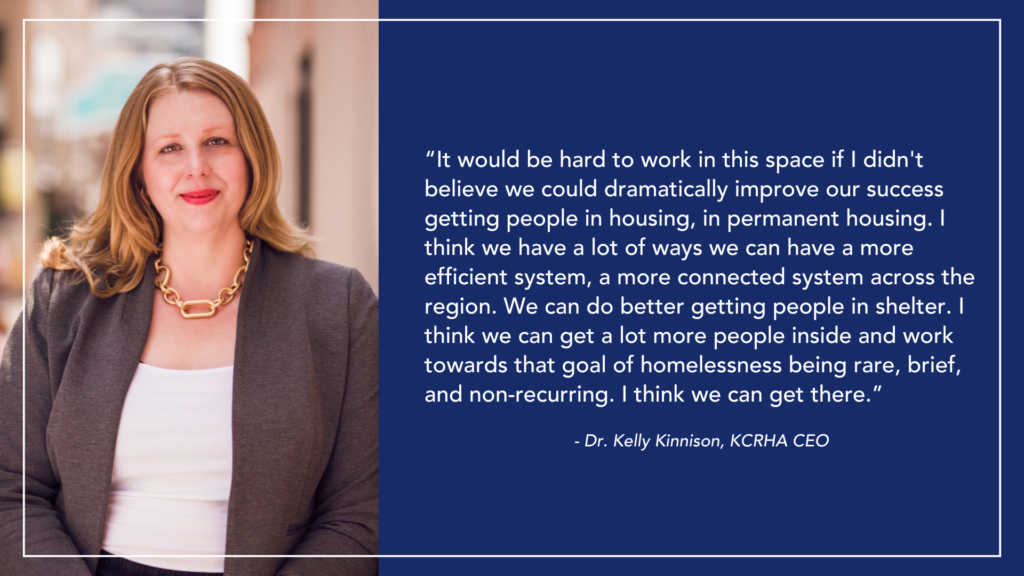Dr. Kelly Kinnison’s journey to become the Chief Executive Officer at the King County Regional Homelessness Authority began earlier this year. From the beginning she felt like she was destined to fill this role. Her interactions with elected leaders, community members and staff along the way only strengthened her excitement and commitment to lead KCRHA in service of people experiencing homelessness. Dr. Kinnison has a Ph.D. in Community Psychology, which gave her the foundation for work in human services policy and research. Before joining KCRHA she was the Director of Family and Community Policy at the U.S. Department of Health and Human Services. In this Q&A Dr. Kinnison shares why she wanted to lead KCRHA, her vision, and the importance of the regional approach to addressing homelessness in King County.
Tell us about yourself.
Kelly Kinnison: Well, I’m a Midwesterner and eventually made my way to the East Coast to do policy work. I started off doing food policy work, which was really wonderful and very place-based and community-oriented. But I quickly learned that the food policy world, especially at the federal level, was siloed from the other programs serving low-income folks such as health coverage and childcare. Having the food programs siloed from the rest of human services was really frustrating for me because I wanted to have more conversations that were person-centered and family-centered. So, when the opportunity came to go to Health and Human Services, I was really excited to be part of the Office of the Secretary where we had some policy and research expertise, bringing those together to help think about the whole picture for low-income families.
Why did you want to lead KCRHA?
KK: I was just so thrilled with the vision from the folks who started putting this together. I know KCRHA evolved out of other organizations with similar goals, understanding the idea that we have to coordinate and de-silo and come together across different sectors to solve this problem together. And that was so evident in some of the materials that I got when I started looking at the position. Centering lived experience, thinking about evidence and data as a big part of our decision making, lifting up best practices across communities, and creating space at that sub-regional level for communities to be different and have different priorities. And I thought, wow, this is great.
The core of my career has been focused on equity and trying to make services and systems more equitable. I thought, I have this great skillset to bring. This is an opportunity to get back to what I was missing in my career, getting back to that community engagement and partnership on the ground.
What is your vision for KCRHA?
KK: My vision for KCRHA will be informed by everything I have to learn, which is a lot. What I’m hearing is that a lot of the pieces that are needed to have an excellent, nationally recognized, regional homelessness crisis response system are here. We’re in a stabilization period right now. If we can develop the relationships that we need, maybe where there haven’t been those same relationships in the past, if we can get more cities to understand what we can provide to them, if we can get business and philanthropy on board, I think we can really build out a stable, effective homelessness response system while having a healthy organizational culture as well. And then from there, I would like to see us be able to set the table for other conversations, whether that’s just being a place where behavioral health and health care and work supports can all come together to talk about what folks need. That would be wonderful. I see a lot of opportunity if we can show that we know how to implement a regional services model, and I think we can do it.
The region has been working on homelessness for some time now and it can feel insurmountable but I’m guessing you do not see it as a challenge that’s too great to overcome.
KK: It would be hard to work in this space if I didn’t believe we could dramatically improve our success getting people in housing, in permanent housing. I think we have a lot of ways we can have a more efficient system, a more connected system across the region. We can do better getting people in shelter. I think we can get a lot more people inside and work towards that goal of homelessness being rare, brief, and non-recurring. I think we can get there. I don’t think it will be fast, but if we all come together and really get laser focused on our scope, communicate with our external partners in a way that’s clear and transparent and use all the resources in the community, with the great service providers that we have access to and some really mature businesses and things like that, people will see progress.
Why is the regional approach still the best way forward?
KK: Working together is really important from a person-centered perspective. I also think it’s good government to streamline services — all the contracting that has to happen to have providers available, to have bed capacity. Think about severe weather issues. Think about what happens when there’s a disaster like the fire we had recently in the tiny homes. Those kinds of things are really challenging for any one municipality to handle on their own, especially some of our smaller municipalities. And so, I think a regional approach in this area makes so much sense.
You started August 1 and since then you’ve had conversations with a lot of people from service providers to staff to board members. What’s something about KCRHA that you would like the community to know?
KK: I would like the community to know how much dedication there is to the mission, how challenging it has been for staff to stay focused on our mission and keep working for the people that we serve every day with the ups and downs that the Authority has gone through. There’s also a lot of lived expertise with homelessness and other systems on the staff. I think sometimes folks assume that because we’re Authority employees, that we’re bureaucrats, that we all come from a position of privilege or some other assumptions about who we are. We’re human beings that have families that have lived experience and really care about helping our communities and our neighbors. I think sometimes the glossing over of the Authority’s work and successes and failures doesn’t get behind that to the people that are also disappointed when something doesn’t work out and joyful when we do something well and can see the impact that we’re having.
This work is challenging. What drives you to continue?
KK: KCRHA is in a position where what we do matters, what we do has an impact on the system, and we see whether that’s moving in the right direction or not. And that’s really motivating for me. My whole career has been about working with folks in poverty and making systems and programs better and more equitable. I’m not a subject matter expert on homelessness or housing, but I certainly know how to build teams and build high functioning, healthy organizations. And I know how to work with people and personally love working in partnerships and on teams. I’m not interested in going it alone. I think that’s what the community was calling for in the next CEO of KCRHA, someone very collaborative who was coming to listen and make the changes that we need to serve folks the best way that we can. That’s very motivating.
You’ve relocated here from the D.C. area. Is there anything in particular that attracted you to the Pacific Northwest?
KK: I’ve been out to the Pacific Northwest a few times to visit friends and really loved the weather and just how beautiful it is. I spent some time on the Oregon Coast. I’ve been to Seattle for work for a site visit. It just had that immediate, wonderful first impression on me. I’m a city person. I love walkable cities. I love public transportation. And being near the water and the mountains, it just it calls to me. My husband and I live downtown, and it was really important to me to live where seeing folks outside every day and what’s happening in downtown Seattle would be part of my daily experience, not just as a part of KCRHA, but as a citizen and a renter. It was really important to me to feel part of the city and bear witness to these issues as they play out in our communities.


